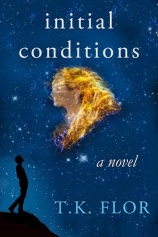“Think in terms of the Olympics – how much can you achieve in a four-year period?”
Joanna Penn, The Indie Author Power Pack: How To Write, Publish, & Market Your Book.
Self-publishing guides warn that success is as likely as lightning striking twice in the same place. Starry-eyed novices are thus advised to come to grips with their expectations, to work assiduously, and meticulously plan the various steps they would take in their career. While there is little to argue about the benefits of working hard while having realistic (or no) expectations, I wonder whether planning years forward is always useful.
The most planned endeavor I’m aware of is the search for Higgs Boson (the Nobel Prize in Physics 2013). This was a multinational effort that involved several upgrades in more than one accelerator. Moreover, it took almost half a century, between the publication of the work that originated the search in 1964, and until the coveted particle was “observed” in 2012.
In the case of the discovery of Higgs Boson, success depended on planning many steps ahead. But physics research from the same year, 1964, also provides counter-examples, when planning ahead did not play an important role.
That year, James W. Cronin, Val L. Fitch and collaborators conducted an experiment that studied the decay of neutral kaons. Sixteen years later, the Nobel Prize in Physics was awarded to Cronin and Fitch, for the discovery of violations of fundamental symmetry principles in the decay of neutral K-mesons. From the Nobel prize presentation speech:
Professor Fitch, Professor Cronin,
The scientific world was shocked when you first announced your discovery. Nobody, absolutely nobody, had anticipated anything like it. You had pursued your experiment with skill and determination and found the impossible to be possible.
Cronin, in his Nobel lecture, said:
The greatest pleasure a scientist can experience is to encounter an unexpected discovery. I am always astonished when a simple apparatus, designed to ask the right question of nature, receives a clear response.
In this example the outcome was surprising, but the experiment was planned. To get a better sense of whether long-term planing is always advantageous, I was looking for something that happened in 1964 in physics that practically came out “from thin air”.
Arno Penzias and Robert Wilson were experimenting with a large radio antenna, when they found a steady noise in the signal. They suspected that the source of the noise was in the instrument or in the atmosphere, but all their attempts to eliminate it failed.To make the long story short, Penzias and Wilson shared the Nobel prize in Physics for their discovery of cosmic microwave background radiation. The “noise” turned to be the oldest light in the universe, a free streaming radiation dating to a few hundred thousand years after the Big Bang. This cosmic microwave background is a cornerstone of modern cosmology.
“Well,” I hear a skeptic voice asking, “What bearing do these accidental scientific discoveries have on self-publishing?”
Personally, I find the anecdotal evidence from physics uplifting. Self publishing, like physics, has many degrees of freedom and many paths not yet explored. So, someone who isn’t good at meticulous planing can take a different route. The lack of an extensive, long-term plan is not a barrier to success.


